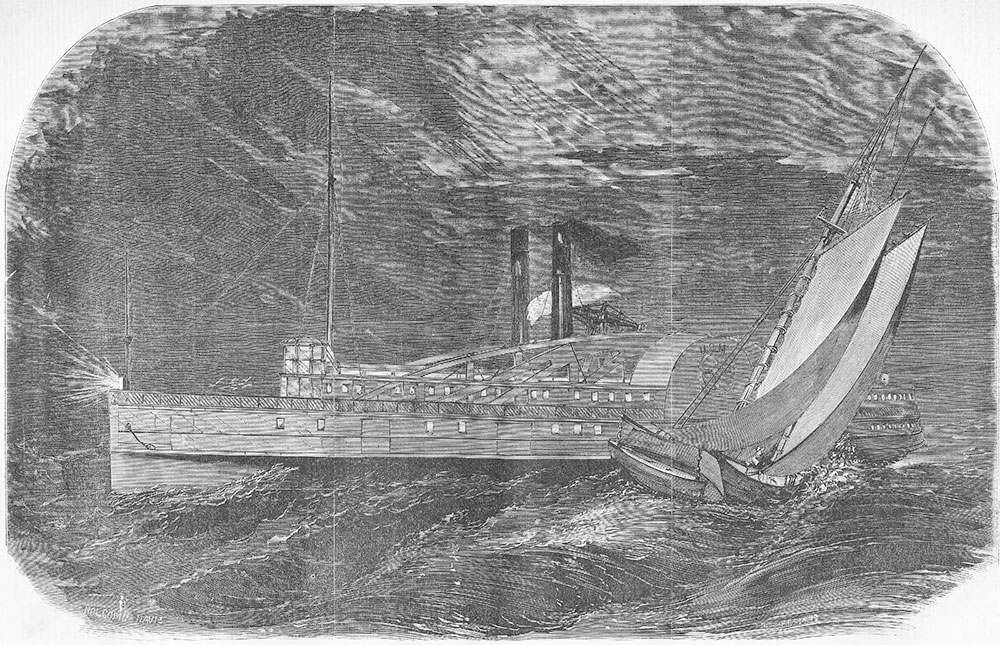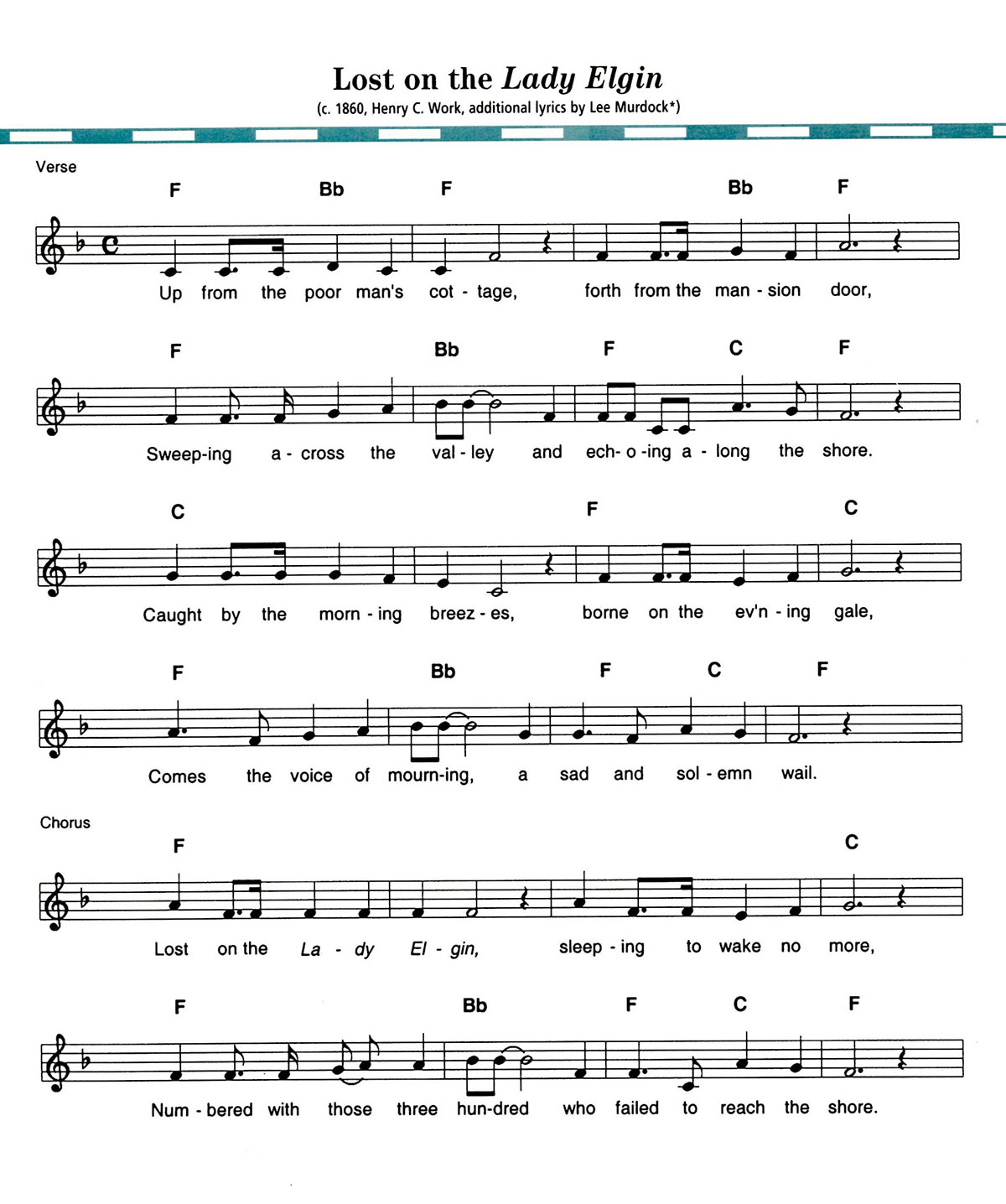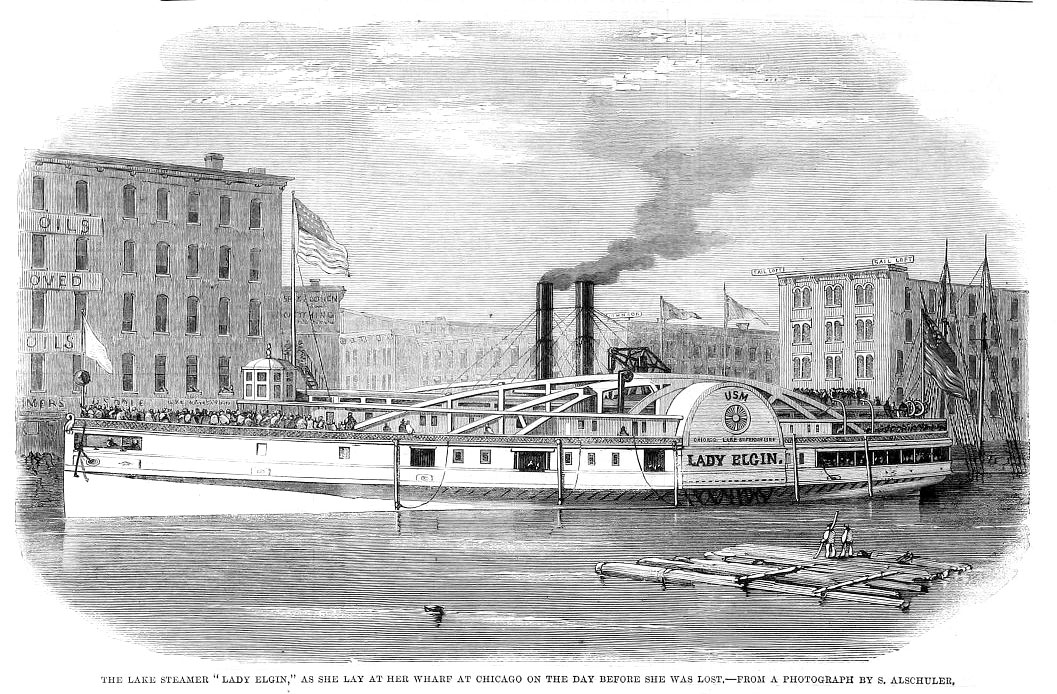Introduced by Lee Murdock
This song was composed by Henry C. Work in the wake of one of the worst maritime disasters to occur until that time. The Lady Elgin was a side-wheel steam-powered vessel, 300 feet long with a capacity of 1000 tons. She carried finished goods, mail, general freight and passengers between lake-towns in the United States and Canada. Her master was Captain Jack Wilson, well respected among his peers and considered a first-rate sailor.
On the evening of September 8, 1860, the Lady Elgin slipped her lines at the dock in Chicago, Illinois, on her return trip down Lake Michigan, the next stop being Milwaukee, Wisconsin. Around midnight, a storm blew up, creating slow going in the frothy seas. The lumber schooner Augusta was heading to South Chicago with her load when she accidentally ran into the Lady Elgin in the confused seas. Although her bow was damaged, the Augusta continued onto her destination, leaving the crippled steamer to her fate.

Shortly thereafter, the Lady Elgin sank, leaving in her wake many passengers fighting for survival, clinging to the debris still floating amid huge waves. As the night progressed, the stormy winds from the northeast continued to rage, blowing the survivors toward shore.
Come morning, over three hundred people had lost their lives, many being dashed along the rocks along the lakeshore, within a hundred feet of salvation. As with many tragic events, this shipwreck was reported in the newspapers extensively, even as far away as England in The Illustrated London News.
Originally, this song spoke to the emotional sense of loss to those families who lost loved ones in this tragedy. As I researched the story behind the song, I came across first-hand accounts of this event that were not related in the original lyrics. Therefore, I took it upon myself (with some trepidation) to “add to the tradition” by writing three additional verses that tell of bravery and sacrifice in the face of this disaster.
Performance by Lee Murdock, with a spoken introduction

Lyrics:
Up from the poor man’s cottage, forth from the mansion door;
Sweeping across the valley and echoing along the shore;
Caught by the morning breezes, borne on the evening gale;
Comes the voice of mourning, a sad and solemn wail.
Chorus:
Lost on the Lady Elgin, sleeping to wake no more,
Numbered with those three hundred who failed to reach the shore.
Staunch was the noble steamer, precious the freight she bore,
Gaily she loosed her cables a few short hours before.
Grandly she swept our harbor, joyfully rang her bell,
Little thought we ere morning ‘twould toll so sad a knell.
Chorus
*A thunderstorm at midnight, big seas began to roll,
One hundred miles of water was the noble steamer’s goal.
But a fatal slash on her port side from a schooner bearing pine,
An eerie silence shrouded all, the dying engines whined.
Chorus
*Oh, here’s to Captain Wilson, may his soul forever rest,
When his noble steamer plunged beneath the surging crest.
Leading songs and prayers for every woman, man and child,
He bravely faced the elements on that long night so wild.
Chorus
*And here’s to Edward Spencer, who lived along the shore,
That night the waves came breaking in with cries above the roar.
Sixteen times he plunged into the boiling surf to wrest
Another soul to safety asking, “Did I do my best?”
‘Tis the sound of children, crying for parents gone.
Children slept that evening, but orphans woke at dawn.
Sisters for brothers weeping, husbands for missing wives,
Such were the ties dissevered by those three hundred lives.
Chorus
*Additional verses added by Lee Murdock.
Reprinted from Lake Rhymes, Folk Songs of the Great Lakes Region, ©2019 by Lee & Joann Murdock
Lee Murdock has one foot in contemporary folk music, and one foot firmly planted in the folk music tradition. In his arrangements of songs from traditional archives, the listener will hear the influences of Woody Guthrie, Leadbelly, David Crosby, Dan Fogelberg, Stan Rogers, Carolan, and Martin Carthy.
Having studied the traditional folk songs of the British Isles and Appalachian American music, Lee discovered the music of the Great Lakes region while searching for the folk songs from his native Illinois and the midwest. In that quest, Murdock uncovered a boundless body of music and stories about the Great Lakes. Grounded in the work song tradition, Murdock comes alongside with ballads of contemporary commerce in the grand folk style.
On the traditional side, Murdock draws heavily on the archives of authentic sailing songs collected in the early twentieth century. Housed at the University of Michigan, Professor Ivan Walton’s collection of songs of the Great Lakes sailors was unpublished until 2002, when Detroit journalist Joe Grimm completed Walton’s work, published by the Wayne State University Press and titled Windjammers, Songs of the Great Lakes Sailors. Murdock’s contribution of the musical scores to the text filled a long-missing link in North American folklore and song.
He has released 21 CDs from 1981-2018, with each recording presenting a balance of traditional, original and contemporary music with a ear to expanding the audience of folk music lovers. With a deeper understanding of the folk process, Lee Murdock’s work is a documentary and also an anthem to the people who live, work, learn and play along the freshwater highways of North America.


 Thanks to the Massachusetts Cultural Council for their generous support.
Thanks to the Massachusetts Cultural Council for their generous support.
 Isaac Banner
Isaac Banner Seth Tepfer
Seth Tepfer Christa Torrens
Christa Torrens Ellie Shogren
Ellie Shogren Sharon Green
Sharon Green Dilip Sequeira
Dilip Sequeira